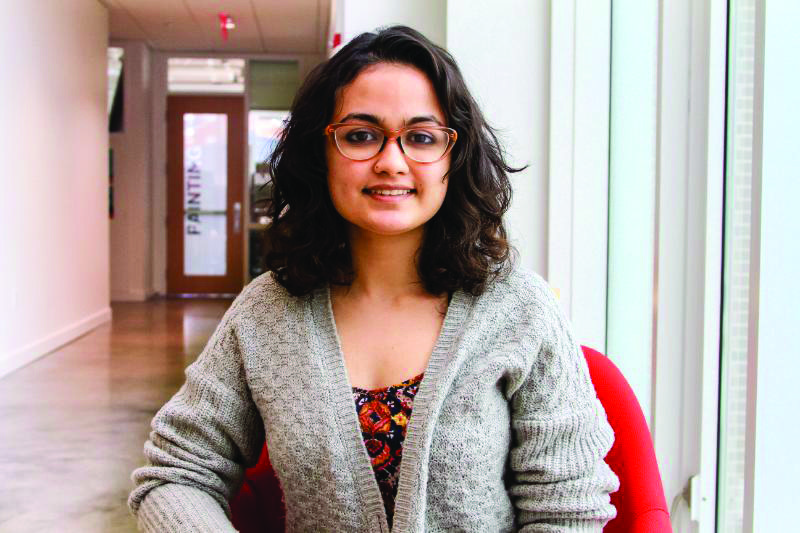Three Earlham College students will spend this summer working toward peace in India and Nepal as part of two projects selected for $10,000 in funding.
Sonia Kabra’s ’16 “Sisterhood Peace Project” will address gender inequality in Science, Technology, Engineering and Math (STEM) education through a grassroots project in India. Her project was one of 120 funded nationally by Projects for Peace. Ananda Mishra ’18 and Maniz Shrestha’s ’19 project entitled “Wireless Education and Women’s Empowerment for Rebuilding Bhimtar” was selected for funding by Earham.
The Sisterhood Peace Project hopes to have 50-70 participants between 13- and 18-years old and will have workshops, assisted by female volunteers from local colleges, aimed at understanding the struggle of women and fostering critical thinking skills; discussions of ambition and struggles; leadership and confidence; career development; stories of eminent women in STEM fields; and a computer and internet skills workshop in collaboration with Feminist Approach to Technology, and NGO in New Delhi that empowers women by enhancing women’s awareness, interest and participation in technology.
“Many girls who attend government schools in rural areas and/or come from impoverished backgrounds accept the oppression caused by the patriarchal society as a part of their fate,” Kabra says about the girls in Jalgaon, India. “Instead of thinking critically about the oppression or fighting it, they become a part of it.

Field trips to universities and technology institutions, including research labs and industries, will supplement the workshops. In addition, participants will be matched with mentors who are pursuing degrees in the participant’s field of interest. Mentors will communicate with the participants once per month and meet with them at least three times per year.
“The aim of this project is to ignite inspiration in the minds of young girls from Jalgaon, India. It is important to note that Jalgaon, which is my hometown, is mostly rural,” says Kabra who developed a similar project in Pakistan with two friends from Pakistan. “Many people do not get the same exposure as one would get living in a bigger city in India. I believe that igniting inspiration and building skills will empower young girls to break the cycle of oppression by becoming intellectually and hopefully, economically empowered. Then they will be considered as strong candidates, poised to enter the workforce.”
Meanwhile in Nepal, Mishra and Shrestha will be cultivating peace in Bhimtar, a small village that suffered a series of earthquakes that collapsed 80 percent of its homes. Following the earthquakes, a new constitution led to political turmoil, which diverted the focus of the government away from the reconstruction programs. The people of Bhimtar now live in tent-like temporary shelters and work in barren fields for their livelihood.
“These are people with no places to live, no food, no income,” Mishra says. “Our project wants to help these people to rebuild their broken lives.”
Their project aims to establish a Center for E-Learning (CEL) at a local secondary school with computers, books and an E-Library system; train students, teachers, and other villagers with computer skills; conduct women’s empowerment and income generating programs; and incorporate internet-based learning programs for the students in the school.
The project collaborates with Microsoft Innovation Center Nepal and will deliver 20 computer screens powered by multiple thin client servers. The project aims to train 70 participants, including teachers and students, to openware learning sources such as platforms like Calibre and Coursera. A local server will be established containing eBooks such as the Harry Potter series and The Lord of the Rings in epub and PDF formats. In addition, 50 secondary and 50 higher secondary level course books will be donated to the CEL. Nepal Telecom will have installed high speed wireless internet in the school by the time of Mishra and Shrestha’s arrival.
“Education can foster peace in any situation,” Shrestha says. “We want their situation to be better than it was before the earthquakes. Anyone who has the willingness to educate themselves, to learn on their own, can come to the Center and apply these skills themselves.”
A second part of their project partners Mishra and Shrestha with Friends of Sankhu to conduct trainings about financial literacy, market research, and organizing groups and cooperatives, all of which will lead to women’s empowerment and income generation activities in Bhimtar. Possible ventures include beekeeping, sewing, poultry and goat farming, gardening and arts and crafts.
“Women in that area want to do something,” Mishra says. “These trainings will help establish long-term solutions to sustain their lives.”
“This project is a wonderful opportunity for us to develop our leadership skills and show people in Nepal that young people can make a difference,” Shrestha says. “If anything can foster physical and emotional peace, this project will.”
The Davis Projects for Peace began in 2007 on the occasion of philanthropist Kathryn W. Davis’ 100th birthday. Until her death at 106 in 2013, Davis was intent on advancing the cause of peace and sought to motivate tomorrow’s leaders by challenging them to find ways to “prepare for peace.” The Davis family continues to honor her legacy by funding Projects for Peace.
Each year Earlham funds an additional summer Peace Project.
Media contact
Brian Zimmerman
Interim co-vice president of marketing and communications
Email: [email protected]
Phone: 765.983.1256